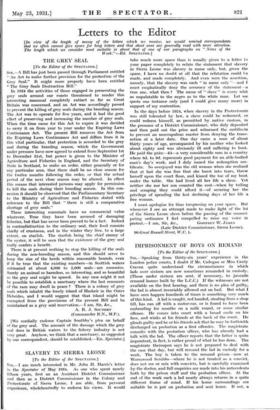Letters to the Editor
[In that The new of . the length of many of the letters which we receive, we would remind correspondents we often cannot give space for long letters and that short ones are generally read with more attention. length which we consider most suitable is about that of one of our paragraphs on " News of the Week."—Ed. SPECTATOR.]
THE GREY SEAL
[To the Editor of the SPECTATOR.1
n,—A Bill has just been passed through Parliament entitled " An Act to make further provision for the protection of the Grey Seal." It might more properly have been entitled " The Grey Seals Destruction Bill."
In 1924 the activities of those engaged in persecuting the grey seals around our coasts threatened to render this interesting mammal completely extinct so far as Great Britain was concerned, and an Act was accordingly passed to prevent the killing of grey seals during the breeding season. The Act was to operate for five years, and it had the good effect of preserving and increasing the number of grey seals. When the time came for this Act to expire it was decided to carry it on from year to year under the Expiring Laws Continuance Act. The present Bill removes the Act from the Expiring Laws Continuance Act and differs from it in this vital particular, that protection is accorded to the grey seal during the breeding season, which the Government under pressure have now agreed to extend from September 1st to December 31st, but power is given to the Minister of Agriculture and Fisheries in England, and the Secretary of State in Scotland, to make an order, either generally or for any particular area, that there shall be no close season for the twelve months following the order, or that the actual period of the next close season may be altered. In effect this means that interested persons may apply for permission to kill the seals during their breeding season. In this con- nexion it should be observed that the Parliamentary Secretary to the Ministry of Agriculture and Fisheries stated with reference to the Bill that " there is still a comparative shortage of grey seals."
These interesting mammals have no commercial value whatever. True they have been accused of damaging fisheries, but that has never been proved to be a fact. Indeed in contradistinction to the ordinary seal, their food consists chiefly of crustacea, and in the winter they live, to a large extent, on starfish. The starfish being the chief enemy of the oyster, it will be seen that the existence of the grey seal really confers a benefit.
There is at present nothing to stop the killing of the seals during the non-breeding season, and this should serve to keep the size of the herds within reasonable bounds, even if it be true that the existing numbers—in Scottish waters' estimated at about 4,000 to 5,000 seals—are excessive. Surely an animal so harmless, so interesting, and so beautiful as the grey seal might be spared. In any case might it not be possible to establish a sanctuary where the last remnants of the race may dwell in peace ? There is a colony of grey seals which inhabit the lonely island of Haskeir in the Outer Hebrides,. and I would suggest that that island might be exempted from the provisions of the present Bill and be maintained as a grey seal reservation.—I am, Sir, &c.,
A. R. J. SOUTHBY
(Commander R.N., M.P.).
[We cordially endorse Captain Southby's plea on behalf of the grey seal. The amount of the damage which the grey seal does in British waters to the fishery industry is not very great. Anyhow, we think that a sanctuary, as suggested by our correspondent, should be established.—En. Spectator.]






































 Previous page
Previous page